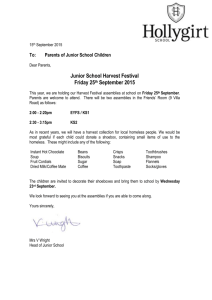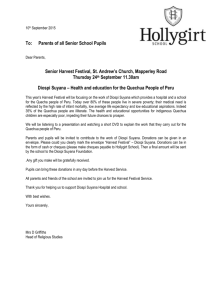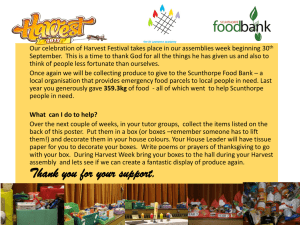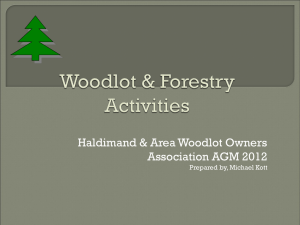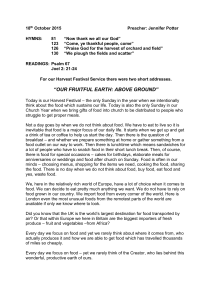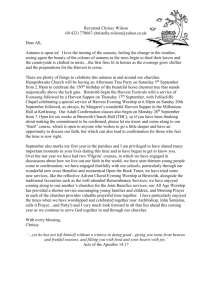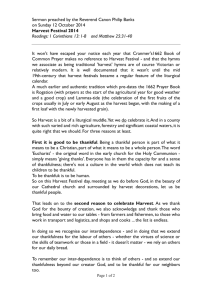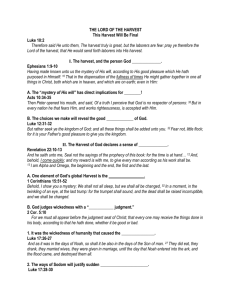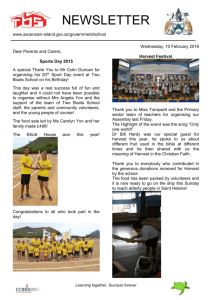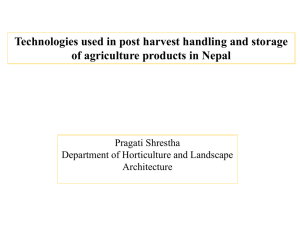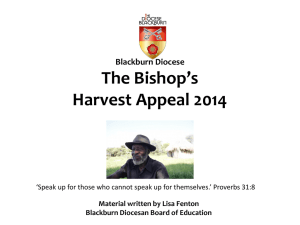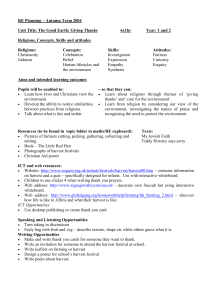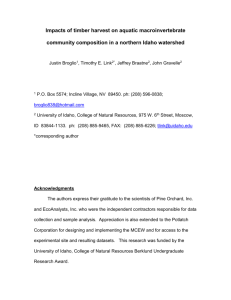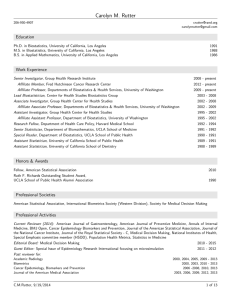Harvest Festival - Blackburn Cathedral
advertisement
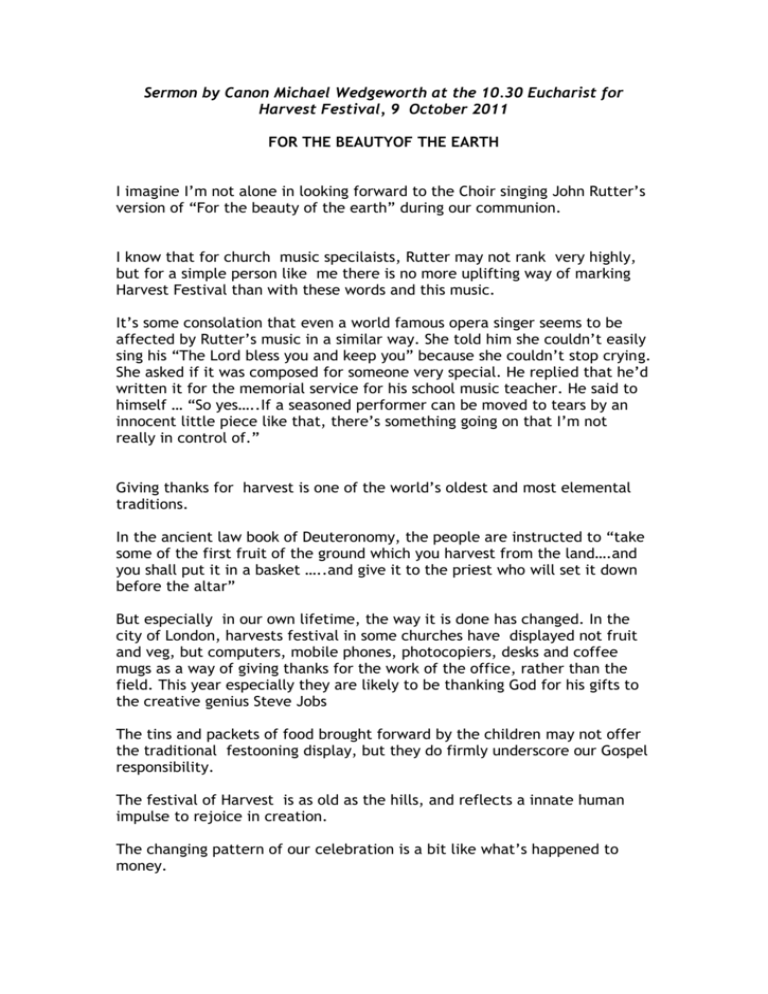
Sermon by Canon Michael Wedgeworth at the 10.30 Eucharist for Harvest Festival, 9 October 2011 FOR THE BEAUTYOF THE EARTH I imagine I’m not alone in looking forward to the Choir singing John Rutter’s version of “For the beauty of the earth” during our communion. I know that for church music specilaists, Rutter may not rank very highly, but for a simple person like me there is no more uplifting way of marking Harvest Festival than with these words and this music. It’s some consolation that even a world famous opera singer seems to be affected by Rutter’s music in a similar way. She told him she couldn’t easily sing his “The Lord bless you and keep you” because she couldn’t stop crying. She asked if it was composed for someone very special. He replied that he’d written it for the memorial service for his school music teacher. He said to himself … “So yes…..If a seasoned performer can be moved to tears by an innocent little piece like that, there’s something going on that I’m not really in control of.” Giving thanks for harvest is one of the world’s oldest and most elemental traditions. In the ancient law book of Deuteronomy, the people are instructed to “take some of the first fruit of the ground which you harvest from the land….and you shall put it in a basket …..and give it to the priest who will set it down before the altar” But especially in our own lifetime, the way it is done has changed. In the city of London, harvests festival in some churches have displayed not fruit and veg, but computers, mobile phones, photocopiers, desks and coffee mugs as a way of giving thanks for the work of the office, rather than the field. This year especially they are likely to be thanking God for his gifts to the creative genius Steve Jobs The tins and packets of food brought forward by the children may not offer the traditional festooning display, but they do firmly underscore our Gospel responsibility. The festival of Harvest is as old as the hills, and reflects a innate human impulse to rejoice in creation. The changing pattern of our celebration is a bit like what’s happened to money. Now we have pounds, the Americans, dollars, the Russians, Roubles, and Ugandans, shillings ….and I nearly forgot, the Europeans, except us, have the euro . Most of these have undergone change over the years, mostly in the direction of decimalisation, like our move from pounds shilling and pence, but the fundamental need for a currency of some kind, a means of exchange, remains. Without it we could not trade, we could not even exist ! It was back in the 1970’s that I was made responsible for the pastoral care of a church in deepest rural Norfolk. There they had the odd practice of the farmers and market gardeners stuffing every nook and cranny of the church with their produce for the Harvest Festival……the sight and smell of it all was just overwhelming…. and then, the following day, after the Harvest Supper, they took it all back again to sell at the City market ! I thought to myself that we should surely have been giving some of this food to the poor, but then I realised….these were, after all, farmers ! During the slap-up harvest meal, I thought I would gently broach this idea with those around me. I felt my opening gambit should be to show that I understood some of the problems being faced by that agricultural community, so I ventured the comment that I expected that decimalisation, which was just coming in, would have a big impact on their business. But the prospects for change seemed very limited when one of them said, and after a very long, lugubrious silence…….“Decimalisation…..Oh no….I don’t think it will spread this far.” The Corinthian letter and Luke’s gospel which we heard just now, specially chosen for this day of course, have two notes in common, and they are repeated many times: abundance and sharing., are and they ways linked together. In Luke, the rich farmer is given a solemn warning, that life does not consist in the abundance of possessions and that a bleak future awaits those who store up treasures for themselves, but are not rich toward God. The Corinthians are shown the cheerful side of this coin. “God is able to provide you with every blessing in abundance, so that, by always having enough, you may share abundantly in every good work.” Both Jesus and Paul look upon the world as a place flowing with milk and honey; its teeming abundance, the beauty and glory of creation, meet not only our need to be fed, but inspire us to see beyond the material to the transcendent music of God who is the source of all that is. But those who are in our time are being called the ‘cultured despisers of religion’ say this is all Sunday School stuff. How can you talk of the glory of creation when the worlds is shot through with tragedy ; where even now in East Africa thousands are in imminent danger of starving to death; where innocent children die in wars which are not of their making; when young men and women in civilised societies are struck down by cancer just as their career is beginning to flower ? Cue our old friend Richard Dawkins says, caustically, that “the universe we observe has precisely the properties we should expect if, at bottom, there is no design, nor purpose, no good, no evil, nothing but blind indifference” But these days, Professor Dawkins and his friends are not having it all their own way. Other professors are writing books to challenge them. One of the best, in a riposte to ‘The God Delusion’ is called ‘Atheist Delusions’. It fully understands that there are no easy answers to the age old problem of undeserved suffering, but feels there is more, much more, to be said. Who was it that established the first hospitals, the first orphanages, who saw it as an obligation to care for the destitute and the outcast but the Christian church ? Where do people go when personal tragedy strikes, as it did for the family of Marine David Fairbrother, but to a church where they can pray and even bring themselves to give thanks (where did this come from ? ) for the lives of those who have been taken from them ? Who are those in the modern world who come to the fore to help when earthquakes or famine kills thousands, or who act to restore communities ravaged by riots and looting, but people of faith ? If there is no God…….if there is just blind pitiless indifference, what is the point ?.....what is it that motivates us to go the aid of those in need ? Is not this drive to do good, to give thanks, this innate compulsion to celebrate the glories of creation itself one of the strongest reasons to believe, whatever happens ? There is a zebra crossing in the city of Cambridge which more than one person here this morning has walked across many times on their way to lectures and tutorials. John Rutter’s son Christopher was a student at Clare College, where his dad had been director of the college choir. He was struck by a car on this very crossing, and killed instantly. Almost certainly as a result of this tragedy, John Rutter contracted ME and found himself unable to compose for several years. Thankfully he got over it, and his prodigious output resumed. Asked if any of his work had been written to commemorate his son he said ‘No…..but perhaps I may yet find a way to do that. One of the wonderful things about being a musician is that you can give voice to things that are hard to articulate in words. We shall see’ I wonder if he was thinking of his son when he wrapped his haunting music around this “For the joy of human love Brother, sister, parent, child Friends on earth and friends above Lord of all to thee we raise This our sacrifice of praise”
